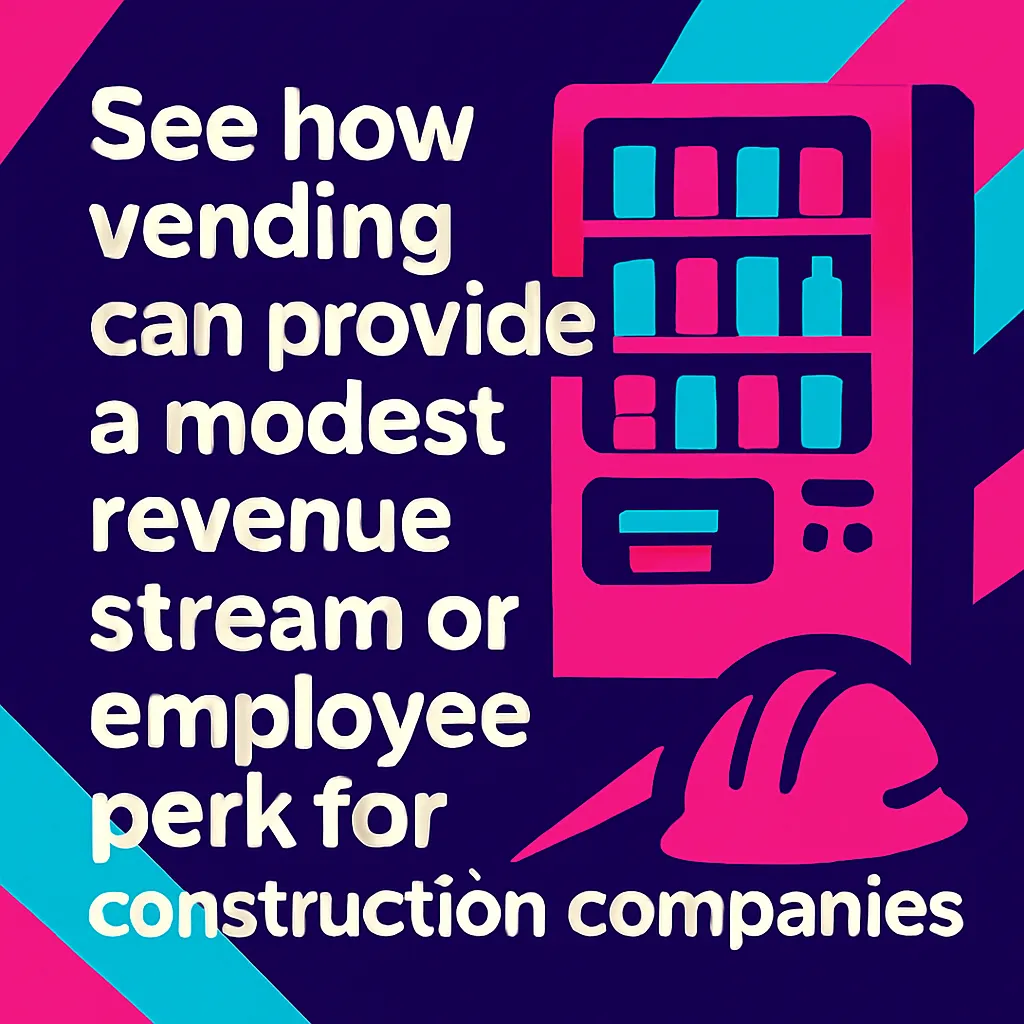Revenue Opportunities from Construction Site Vending
See how vending can provide a modest revenue stream or employee perk for construction companies.
Back to Vending for Construction SitesSee how vending can provide a modest revenue stream or employee perk for construction companies.
Back to Vending for Construction SitesVending machines offer a dual benefit for construction companies: a convenient source of refreshments for hard-working crews and a potential ancillary revenue stream. By providing quick access to snacks and drinks directly on-site, businesses can boost morale, sustain energy levels, and minimize time lost to off-site food runs.
![]() Boost employee satisfaction with convenient on-site refreshments
Boost employee satisfaction with convenient on-site refreshments
![]() Generate a passive revenue stream through commission-based sales
Generate a passive revenue stream through commission-based sales
![]() Enhance productivity by reducing off-site travel for food and drinks
Enhance productivity by reducing off-site travel for food and drinks

Construction sites are demanding environments where access to quick and convenient refreshments can make a significant difference in worker morale and productivity. While the primary goal of providing on-site vending is often to keep crews hydrated and energized, these machines also present a tangible opportunity for revenue generation or cost savings for contractors and project managers. Understanding this dual benefit can help businesses optimize their operations and foster a more comfortable work environment.
Downtime is costly on any construction project. When workers have to leave the site to purchase snacks or drinks, it not only impacts their individual productivity but can also disrupt the entire workflow. By providing vending services for construction sites directly where the work happens, companies ensure that employees spend more time on task. This immediate access to provisions supports continuous work and reduces the temptation for unauthorized breaks or trips to external stores. You can also explore options like after-hours vending for construction crews to support shifts that extend beyond standard business hours.
Many construction companies can earn a commission on the sales generated by on-site vending machines. This means that every snack or beverage purchased contributes directly to the project's bottom line. While the revenue from a single machine may be modest, across multiple sites or over the duration of a long-term project, these commissions can accumulate into a valuable ancillary income stream. This model typically involves minimal effort from the construction company, as the vending service handles installation, stocking, maintenance, and all operational aspects. Investing in security for construction site vending machines can further protect this revenue source.
Beyond direct revenue, vending machines can serve as an excellent employee perk. Offering readily available refreshments demonstrates an investment in worker well-being, which can significantly boost morale. A well-stocked machine with popular snacks and drinks can be a welcome sight after hours of physical labor. This focus on employee comfort can contribute to higher job satisfaction and potentially reduce turnover in an industry where skilled labor is often in high demand. Consider options like hydration station vending for sites to keep workers cool, and coffee vending for job sites for early morning starts.
To maximize both revenue and employee satisfaction, the product selection in construction site vending machines should cater specifically to the needs of the workforce. High-protein snacks, energy drinks, bottled water, and hearty meal replacements are often top sellers. Understanding these preferences ensures that machines are consistently utilized, driving both commission revenue and worker satisfaction. For optimal efficiency, consider the optimal placement of vending machines on construction sites to ensure accessibility.
Integrating vending machines into site planning is straightforward. Modern industrial-grade machines are built for durability and can be placed in high-traffic areas or designated break zones. They require minimal space and can often operate with standard power connections. The key is to partner with a vending service that understands the unique logistical challenges of construction sites, including delivery schedules, inventory management, and maintenance in rugged environments. Read our case study on how vending keeps construction crews productive for a real-world example.
Whether your goal is to generate ancillary income, enhance employee perks, or both, strategically placed vending machines on construction sites offer a straightforward solution. They provide much-needed convenience, contribute to a positive work environment, and can subtly contribute to overall project profitability. Explore how these solutions can be tailored to meet your specific construction needs.
Vending machines provide convenient on-site access to snacks and beverages, keeping workers fueled and reducing downtime from off-site trips.
High-energy snacks, cold drinks (water, sports drinks), coffee, and quick meal options are ideal for supporting construction workers.
Companies can earn a commission on sales, creating a modest revenue stream, or use them as a perk to boost employee morale and productivity without direct cost.
Yes, there are rugged, industrial-grade vending machines specifically designed to withstand the harsh conditions of construction sites.
Robust security features, strategic placement, and remote monitoring help protect machines from theft and vandalism.
Absolutely. 24/7 vending machines ensure that crews working late shifts or early mornings always have access to refreshments.
Most modern vending machines require a standard electrical outlet, but some heavy-duty or specialized units might have specific power requirements.
Servicing is typically handled by external operators who manage stocking, maintenance, and repairs, minimizing disruption to site operations.
Yes, many vending options include healthier choices like granola bars, fruit, and bottled water to support worker wellness.
Once a location is approved, installation can often be completed within a week, ensuring quick deployment of services.